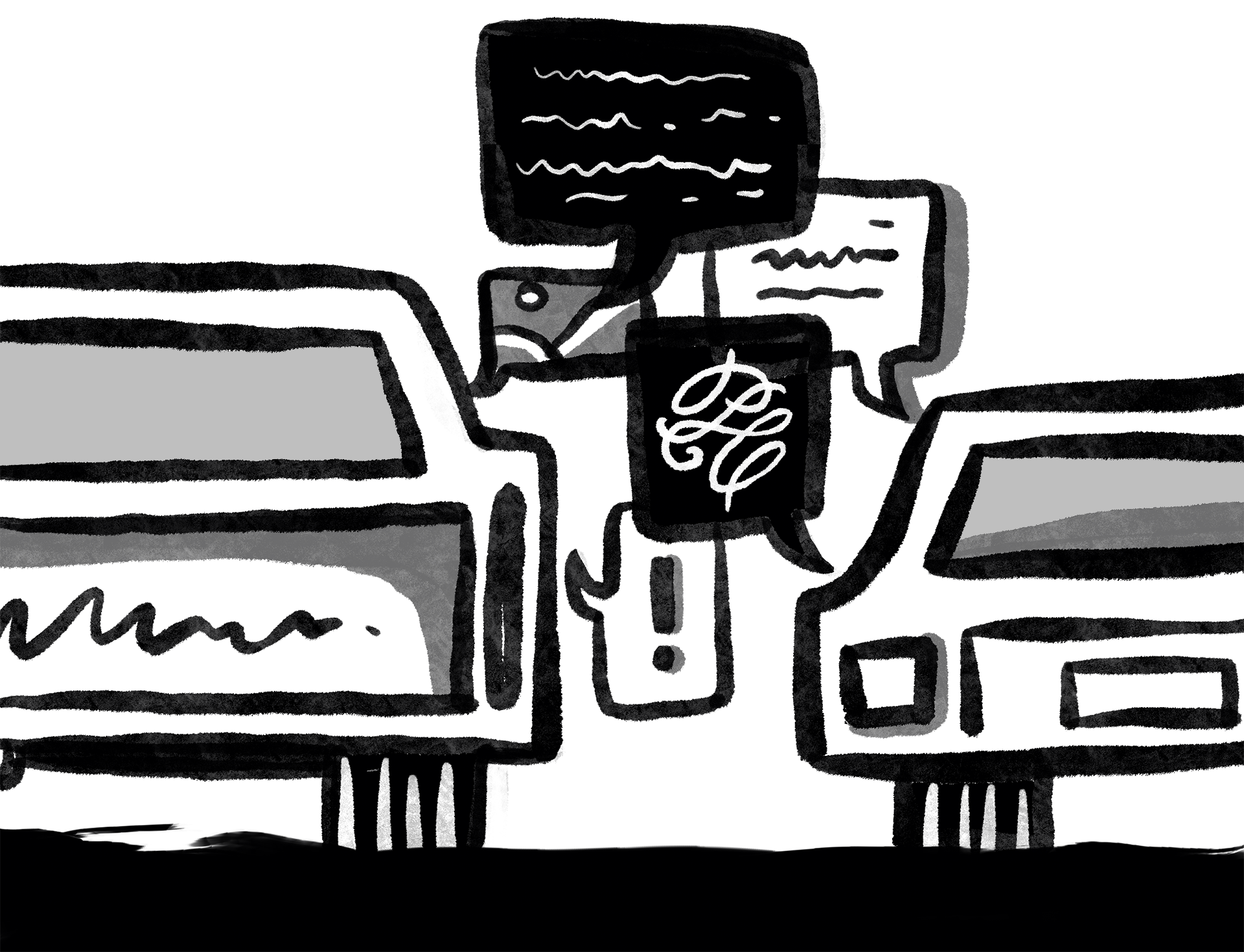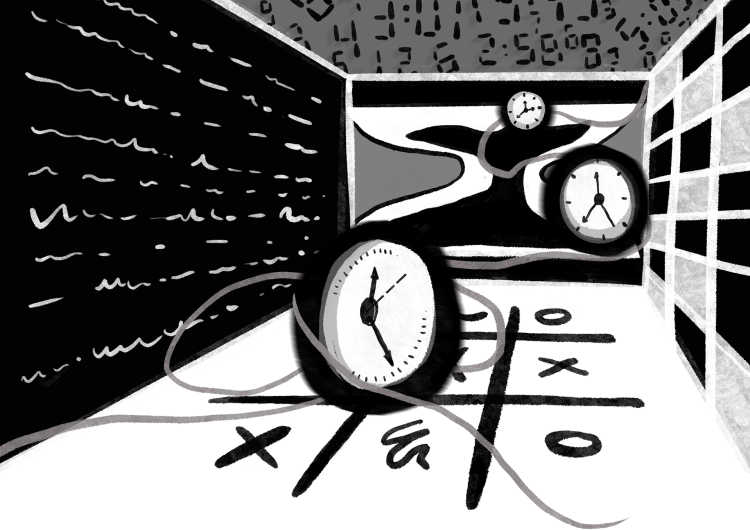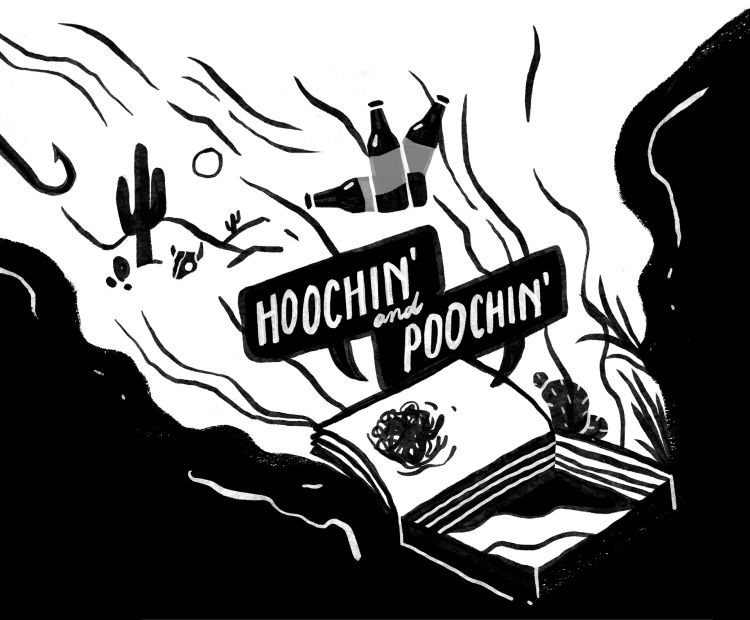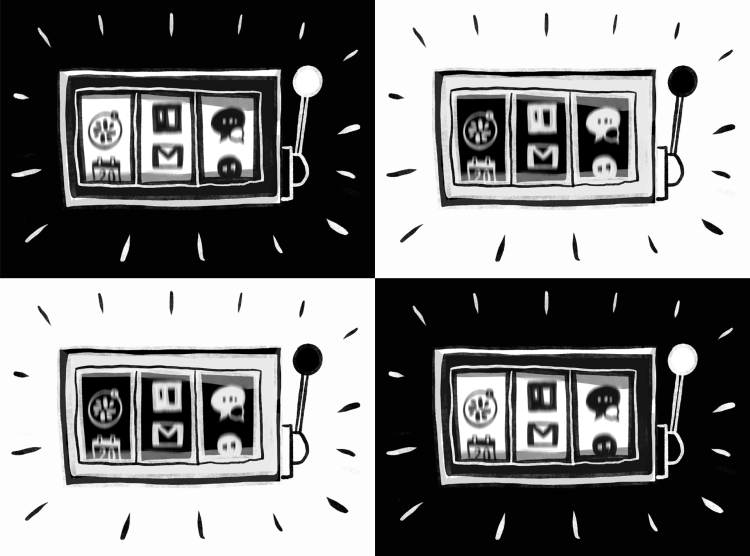We are a group of creative people who help organizations make their ideas beautiful.
The Waiting Room
A fiction writer’s first month writing ads
First—I should tell you how I got here.
Three Christmases ago, I sold everything I owned and moved into my car. A disenchanted millennial with too many loans and not enough promise, I thought I’d see the country and maybe write about it.
Winters are cold in St. Louis, and when you’re sleeping in a truck stop the day after Christmas, Jack Frost nips at more than just your nose. Wrapped up in the back seat of my Chevy Blazer, I thought like a goose—South. But geese don’t know why they fly south. They simply follow the bird in front of them hoping it knows the way to open water. And the lead goose is just honking up there, turning his head, asking for direction from behind.
I pulled back onto the highway and aimed for Texas.
I had a relative in Dallas who bounced around the Florida Keys in the 80s sleeping in tents, snorkeling all day and drinking like Hemingway at night. He moved to Texas to work as a wildlife biologist, but was about to retire and spend the rest of his life fly-fishing for Guadalupe Bass. If anyone could give me direction, it was him.He told me to go to a little town called Castell, Texas. It was just my speed, he said, and he was right, because when I landed there I got stuck. I became as much of a local as you can be in a place where the houses are miles apart and the only place to congregate is the local bar.

The man who owned that bar, it turns out, was waiting for someone like me to come through. He wanted a writer to draft a book set in his little hometown, thinking the notoriety would draw weekenders from Austin.
He paid me cash and set me up in a guesthouse on a thousand-acre cattle farm. I flipped burgers at the bar and got to know the locals. The place was wild. Outside the law. Honest, meager, hilarious life bubbled in the Castell General Store and I did my best to capture it.
As a novelist, I never left the ranch without my notebook and pen, constantly writing down phrases I heard on barstools, and in cattle pens and churches. My notebook was a tunnel that carried ideas from the raw, unpredictable, often meaningless minutiae of everyday life to the curated, purposeful world of my novel. And when the book felt like it was losing its way, my notes helped ground the story, making it recognizable to the real people who would eventually buy it.
When I sat down to write, I’d flip open my notes and look for something that sparked an image. I would take a phrase, something like, “hoochin’ and poochin’” and build a scene around that simple idea (Hoochin’ and poochin’ is when you load your dogs into the back of your pickup, grab a bottle of hooch and cruise the backroads).
I’d start with that phrase and work outward from there. Who would say this? Who did say it? Could I use that person as a character?
If the person that said it wasn’t interesting enough, I could borrow bits and pieces of them and mold someone new. The blank page never felt too empty to me when writing fiction. Quotes and true-to-life details would fall from my journal and splatter onto the page, leaving a mark, giving me a place to start.
When the project in Castell was over, I didn’t want to quit writing. But something was missing in Texas. I didn’t have an editor. I didn’t have a mentor. All I had was an old cowboy that loved reading his raunchy stories. I wrote when I wanted, how I wanted, but no one listened.
So, I moved back home. St. Louis is cold, but in the spring, you can hear geese overhead, and there is plenty to write about. More importantly, I trusted there must be people in St. Louis that loved stories as much as I do. I found them at Paradowski.
I heard about Paradowski at night in the parking lot of a minor league baseball stadium. I was meeting up with a friend to sell him one of my freshly printed novels. We talked about writing for a while in the dark next to our running cars. He worked at an ad agency in St. Louis, and when I asked if they were hiring copywriters he said, no.
“Everyone is leaving [my agency] and getting hired on at a place called Paradowski.”
A few weeks later, I sat down and did my homework.

Paradowski’s call page for applicants was written in a tone that I recognized. Conversational, quick, self-aware.
For one of the few times in my life, I took a chance and believed what a company was trying to make me feel.
I imagined the person on the other side of the submissions page, and started a conversation with them. I responded with a story and a perspective, and it worked. Honesty and humility worked. I got hired on.
My first day at the agency, I didn’t need coffee. My chest was already knotted.
There are no cubicles at Paradowski, just one giant shared workspace surrounded by meeting rooms. Dazzling pieces of successful, polished advertising hang on the walls next to portraits of celebrities and witty pop culture artifacts that shout jokes from every corner of the room. Exposed pipes and wires hang overhead.
It’s too bright, I thought. Beauty isn’t created in bright, shiny, industrially chic rooms. It’s displayed there. In theatre, the director sits with the audience—dark and anonymous. But that first day, I felt like the idiot in tights up on stage.
On my second day, in a meeting room, I watched my new coworkers file in. Each of them were armed with a laptop; the machine of all matters, the engine, the heart. I only brought my notebook. The screens around me flashed like slots in a casino.
They spoke in a strange language, too. I was told I’d be kicked off, slacked, downloaded, honked, workamajigged.
What? Did she just say, honked?
Pretty quickly, I started getting assignments. Softball stuff at first, but right away I felt the differences between writing fiction and writing copy. One assignment stands out in particular.
I was asked to name a cocktail that was going to be served at a cooking-themed holiday party Paradowski was planning for a client. Not too hard. I just had to think of a few words, and I knew plenty of words—I just finished writing thousands of them, in order, in a book. I sat at my desk and stared up at the exposed pipes and concrete in the ceiling. Nothing came. The world stopped spinning.
Ok...drinks, drinks, drinks. Drunk. Drinking. Alcohol. Bourbon. How about The Bourbon...Drink. No. Jesus. Um. Vodka. Vodka. Fuck.
I was stuck in a mental space that only exists in copywriting. I call it the “waiting room.” If you’re a writer, you know where the waiting room is.
If you aren’t a writer, you’ve experienced something similar when someone asks, Where do you want to go for dinner?
Then, I remembered my old notebook. I started flipping. Looking for lines I could foist. The real world flowed in, my old familiar crutch. I read quickly through the phrases and quotes:
“The colors, partner. I do it for the colors.”
Could I name it, “The Colors?” No.
“Flickin’ crickets.”
“Poop so long, the lights turn off.”
“Tell the mutt a joke.”
There might be something there with “mutt” and “muddle.” Keep flipping.
“Aw, sheyut.”
“Bumper crop.”
“Rebel in tweed.”
Yes. “The Rebel in Tweed.” It’s sophisticated and subversive, and it only took three minutes.
We all piled into a room to talk about the event. Account people, project managers, designers. Someone brought their dog. The meeting eventually turned to me.
“Cody, what are you thinking for a drink?”
I took a breath.
“How about, a Rebel in Tweed?”
You know immediately when someone doesn’t like your idea. First, they’ll nod their head stiffly and look slightly up and to the right. All you can do is sit there with your warped, globular, stillborn loogie of an idea in your lap, so painfully, uniquely wrong in a way that’s obvious the second your tongue flicks the first syllable. Obvious to everyone in the room. Even the dog.
“Well, the guests will be wearing cotton aprons. And, I don’t know if rebellion is the right theme here.”
“Um.”
“That’s ok. What about some alternatives that play on the cooking theme?”
That’s another one—alternatives. Alternative means something better. It means, You fucked this one up, didn’t you?
“Uh. HONK! I don’t have anything HONK! else, right now.”
Copywriting is not fiction. You’re paid more for fewer words. But the ones you do write must work immediately without the luxury of space.
Bang. The idea impresses. There is no time to explain yourself. In fiction, you attempt, at length, to depict a universal truth. In advertising, you pick through a bucket of universal truths looking for one that fits the brief.
And, there are pictures.
The coolest part, really, about this job is that you get to work with designers. You get to say, “I have a 3:30 with a designer to brainstorm visuals.” Designers have the best job title in the world, except maybe chancellors, or tug masters (I’ll wait while you type “tug master job” into Google then decide against it). Design gives writing consequence.
When I was working as a novelist, I opened my notebook and manure fell out onto the blank page—good, healthy, rich dung, full of seeds and bits of life.
But as a copywriter, my notebook was empty. I had to have new ideas that solved new problems.
In long-form fiction, you start with a bit of inspiration and work outward, building scenes around it. When writing copy, the scene already exists. The scene is the context of the ad. It’s the medium, it’s the brand’s reputation and tone, it’s the demands of the assignment. And your few lines of copy have to slide right into this scene and move the story along without disrupting the show.
Towards the end of my third week, my writing was tightening and my chest was loosening. I was cranking out better ideas, faster. Volume in copywriting, like fiction, is key. Don’t ever get stuck with one idea.
I still have the notebook, but now it’s filled with a different type of inspiration. A targeted inspiration that doesn’t start until I’m briefed on the assignment. I try to build a hallway that gets me out of the waiting room, the walls of which are the context of the brand. But, I make sure not to walk too straight. It’s more fun to stumble.
Which reminds me. If you’re looking for something new to serve at dinner parties, try this:
Bent Whisk
1 1/2 ounces bourbon whisky
1 ounce lemon juice
1/2 ounce simple syrup
2 ounces club soda
Garnish with maraschino cherry and orange slice



